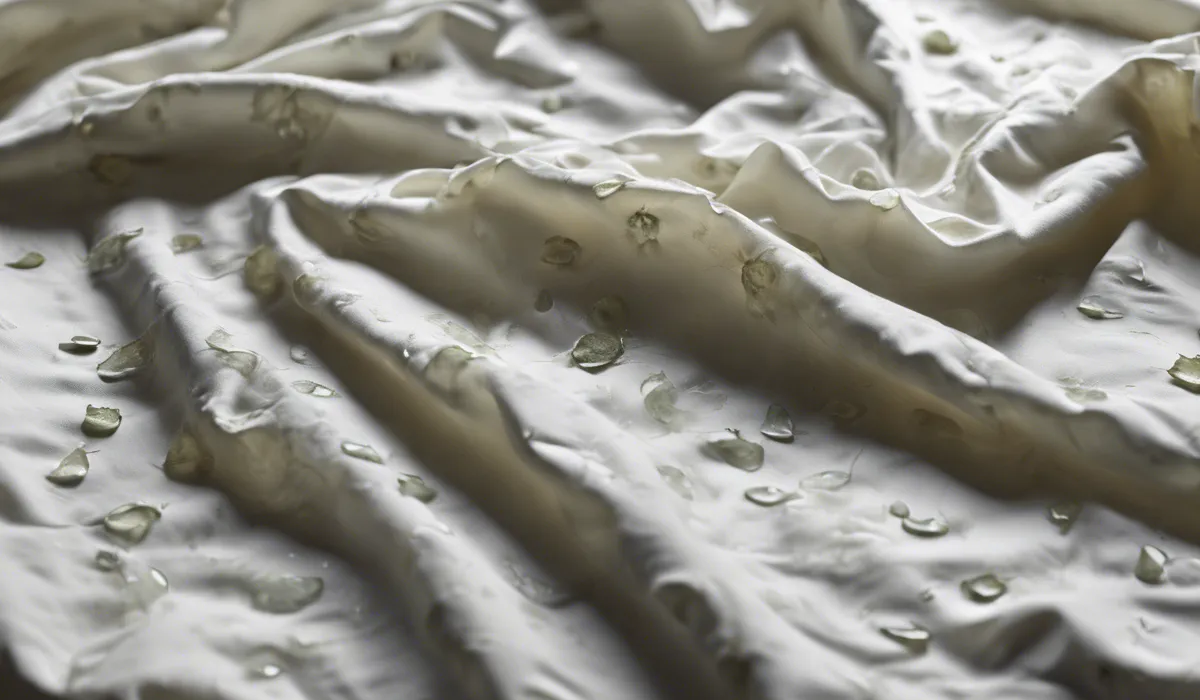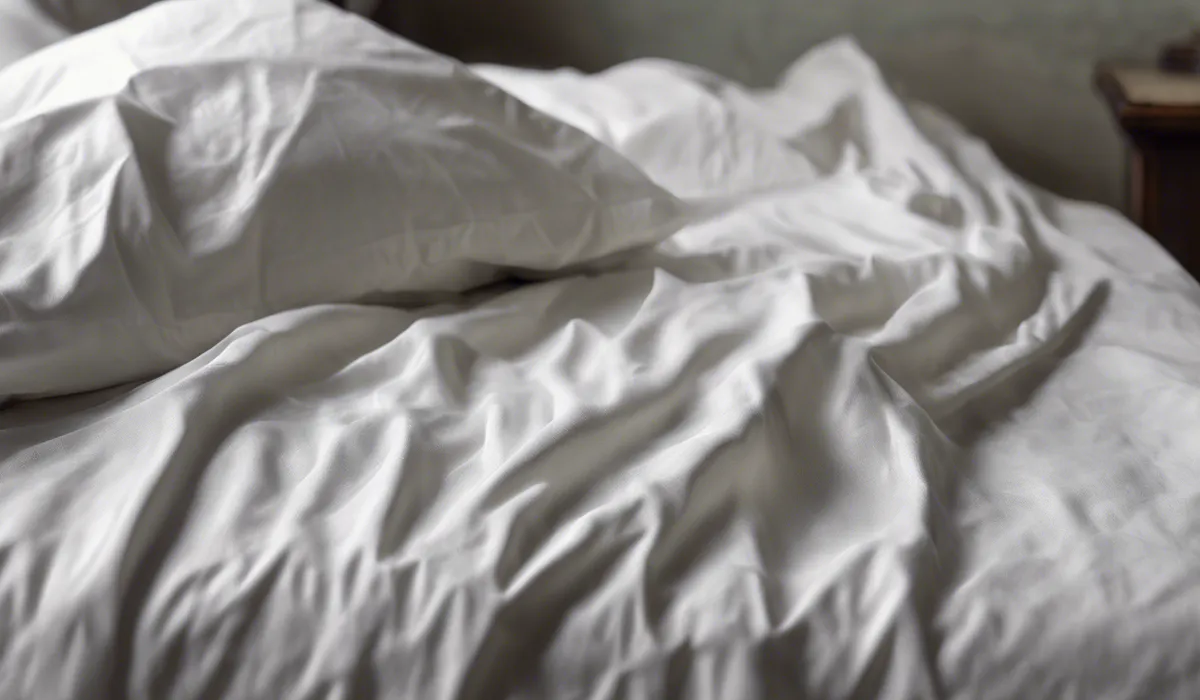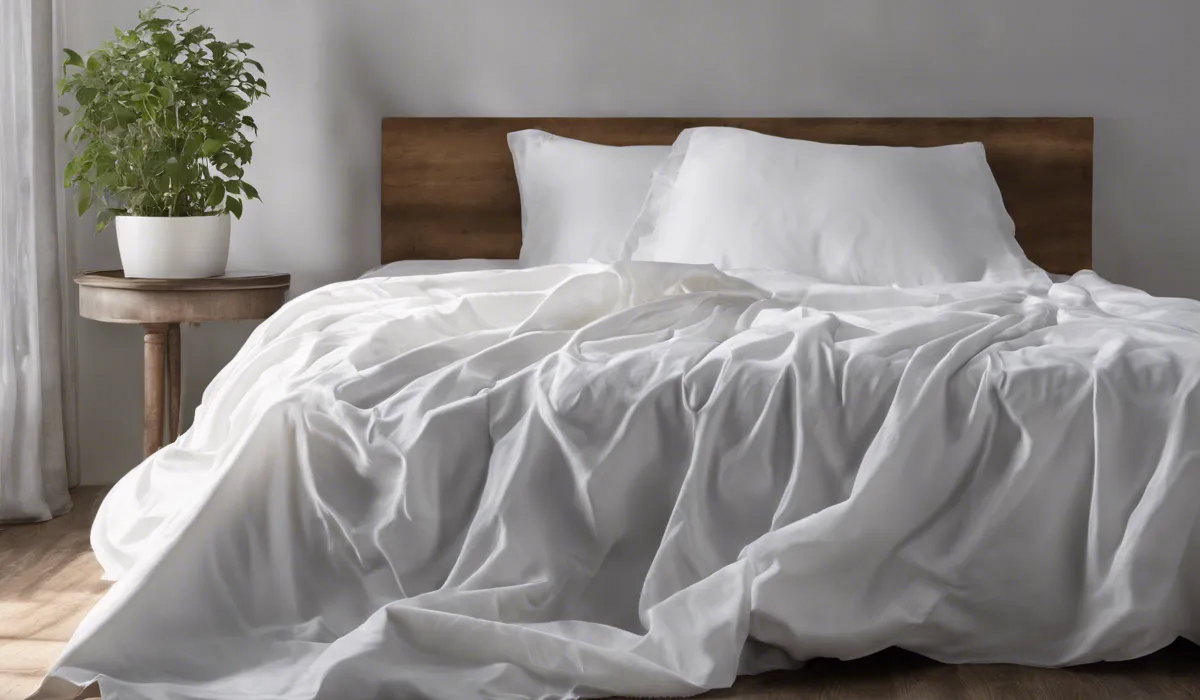Mildew on sheets can be dangerous as it may cause allergic reactions or respiratory problems in sensitive individuals. It’s important to wash mildew-infested sheets promptly to mitigate health risks.
Understanding Mildew

Defining Mildew and Distinguishing It from Mold
Mildew is a type of fungus that thrives in warm, damp environments. While often confused with mold, mildew is actually a specific kind of mold characterized by its flat growth and white or grayish color.
Mold, on the other hand, can appear in a variety of colors and affects surfaces more deeply than mildew, which tends to stay on the surface.
Both can grow on a variety of surfaces, including fabric, but mildew is particularly common on damp materials like bathroom grout, window sills, and of course, sheets.
Conditions Favoring Mildew Growth on Bedding
Mildew on sheets occurs under certain conditions. The primary culprit is moisture.
Whether it’s from sweating during the night, high humidity in your bedroom, or leaving sheets damp after washing, mildew needs moisture to grow.
Poor ventilation and warm temperatures are also contributing factors, creating an ideal breeding ground for mildew spores to settle and multiply on sheets.
Materials Most Vulnerable to Mildew
While mildew can grow on a variety of materials, certain fabrics are more susceptible. Natural fibers like cotton and linen are particularly prone to mildew because they absorb and retain moisture well.
Conversely, synthetic fibers like polyester and microfiber are less likely to support mildew growth because they tend to dry more quickly and wick away moisture.
Health Risks Associated with Mildew on Sheets

Allergic Reactions and Respiratory Problems from Mildew
For individuals with sensitivities, mildew can cause a range of allergic reactions. Symptoms may include sneezing, coughing, sore throat, and itchy eyes.
Additionally, mildew can lead to respiratory issues, as spores inhaled during sleep can aggravate the respiratory tract, causing inflammation and difficulty breathing.
Exacerbating Asthma and Chronic Conditions
People with asthma or other chronic respiratory conditions may find that mildew on sheets worsens their symptoms.
The presence of mildew can trigger asthma attacks and increase the severity of other respiratory ailments.
It is essential for individuals with these conditions to maintain a mildew-free sleeping environment to help manage their health.
Potential Skin Irritation and Infections
Not only can mildew cause respiratory problems, but it can also irritate the skin.
Sleeping on mildew-infested sheets might result in rashes, itching, or even bacterial skin infections, especially if there are any existing cuts or sores.
Prevention and Remediation

Mitigating Mildew Growth Through Prevention
Preventing mildew begins with regular washing of your sheets. It’s recommended to wash them at least once a week in hot water to kill any spores.
Additionally, controlling moisture in your bedroom is crucial. Use a dehumidifier if you live in a high-humidity area, and make sure your room is well-ventilated.
After washing your sheets, ensure they are completely dry before putting them back on the bed.
Effective Cleaning Practices for Mildew Removal
If mildew does occur, it’s important to clean your sheets properly. A mixture of hot water and vinegar can help kill mildew spores.
For stubborn mildew stains, a small amount of bleach may be necessary, but be sure to use it only on white or colorfast materials to avoid damaging your sheets.
Always follow the care instructions on your bedding to ensure you’re using the best method for the material.
Knowing When to Replace Your Bedding
Sometimes, despite your best efforts, sheets may become too mildewed to salvage. If the mildew has deeply penetrated the fabric or if a strong odor persists even after thorough cleaning, it might be time to discard the sheets.
Consider replacing old bedding with materials that are less prone to mildew, like those with moisture-wicking properties.
By following a proactive approach to preventing mildew and understanding the risks associated with it, you can ensure a healthier, more comfortable sleep environment.
Remember to stay vigilant about the conditions in your bedroom that could lead to mildew growth and to clean or replace sheets as needed to keep your sleeping area fresh and safe.
FAQs About Mildew on Sheets
Can mildew on sheets cause health problems?
Yes, mildew on sheets can cause health problems such as allergic reactions and respiratory issues, especially in individuals who are sensitive or have allergies.
Is it safe to sleep on sheets with mildew?
No, it is not safe to sleep on sheets with mildew due to the potential health risks they pose, including skin irritation and respiratory difficulties.
How quickly should you wash mildew-infested sheets?
Mildew-infested sheets should be washed promptly to prevent health risks and further growth of mildew.
What are the signs of mildew on sheets?
Signs of mildew on sheets include a musty smell, visible stains which can be black, green, or white, and sometimes deterioration of the fabric.
Can cleaning remove all mildew from sheets?
Cleaning with appropriate methods can often remove mildew from sheets, but heavily infested sheets may need to be discarded if cleaning does not fully eliminate the mildew.
Final Thoughts
Mildew on sheets poses health risks, particularly for those with allergies or respiratory sensitivities.
It’s crucial to address this issue swiftly by washing the affected bedding to prevent potential adverse health effects.
Regular cleaning and maintaining a dry environment can help avoid mildew growth on sheets.
